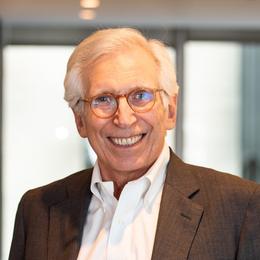
|
|
| Peter Osnos | |
Is there any major political or cultural figure in the U.S. or Russia who Peter Osnos didn't meet or publish in his career of more than 50 years? That career started in the 1960s when he worked a year at I.F. Stone Weekly and then covered the Vietnam War for the Washington Post, and continues today as the head of an indie press, Platform Books, distributed by Ingram's Two Rivers. Its first title, just published, is Osnos's memoir, An Especially Good View: Watching History Happen.
Osnos did indeed have an especially good view in the late 20th and early 21st centuries. Besides being stationed in Saigon during the height of the war, he was the Post's Moscow correspondent in the 1970s, as the Cold War began to thaw slightly, and was foreign and national editor during the newspaper's glory years under owner Katharine Graham and executive editor Ben Bradlee. In 1984, he became an editor and publisher at Random House and at its Times Books imprint, then left and in 1997, founded PublicAffairs, which is now part of Perseus Books at Hachette Book Group.
His mentors include legendary political journalist I.F. Stone, Ben Bradlee and Bob Bernstein, longtime head of Random House and an important human rights activist. He was a close friend of Soviet dissidents, particularly Andrei Sakharov and Natan Sharansky, both of whom he published. He's also published a range of U.S. and international figures, including Barack Obama, Bill Clinton, Jimmy Carter, Tip O'Neill, Robert McNamara, George Soros, Vernon Jordan, Andy Rooney, Peggy Noonan, Molly Ivins, Magic Johnson, Markus Wolf, Boris Yeltsin, Vladimir Putin and Donald Trump. Most he admired and some he became friends with; others he offers tart comments about.
 The book is a meditation on memoir and autobiography, too, and explores the vagaries of memory. (One of its many fascinating aspects is the fact-checking he did about things that happened many, many years ago, using his skills as a reporter.)
The book is a meditation on memoir and autobiography, too, and explores the vagaries of memory. (One of its many fascinating aspects is the fact-checking he did about things that happened many, many years ago, using his skills as a reporter.)
He also offers his riveting family history, which includes his parents' and brother's daring and life-saving flight from Poland after the Nazi invasion; his birth in India; and growing up American on the Upper West Side of Manhattan, distanced from his parents, who remained rooted in Central European culture.
Recently we asked Osnos about publishing and his views on current issues and Platform Books.
Shelf Awareness: You have long advocated that books should be available to readers in whatever form they want as quickly and efficiently as possible--as exemplified by the far-sighted Caravan Project, which you founded and ran. In your view, how does the situation stand today, particularly considering the creation of libro.fm, the expansion of POD facilities, the growth of podcasts and Audible, and, interestingly, the resilience of the printed book?
Peter Osnos: The situation is definitely improved. But my impression is that customers still feel that buying a book from an independent that is not in print or in the store can be complicated. Everyone knows there is a convenient online default for purchase. So, the more stores can promote alternate formats, the more likely they are to be sold. "Good Books. Any Way You Want Them. Now."
SA: How has the pandemic changed publishing and bookselling? What's for the better? What's for the worse?
Osnos: For better, it has been clearly demonstrated again that books are strong in the very crowded media marketplace. For worse, there's further proof of the online dominance of Amazon. Overnight delivery. Often discounted prices. Immediate, easy download. This was especially a fact when bookstores had to be closed.
SA: How do you see the role of books in the current political times, with such deep divides in the country?
Osnos: The Trump era was unique in modern times for turbulence. My view of political books in our polarized culture is that to do them, they should meet two requirements:
A. They must have the same standards of quality, credibility and overall tone as any other book I would publish.
B. Politicians seeking to cash in (often for books they do not themselves write) should be told they will earn every penny in royalties that the contract provides. But paying them multi-million-dollar advances is corrupting to the political process and the people. Public service is not an automatic payday.
SA: In your career, you published many memoirs and policy books and histories by a range of U.S. and international figures. There are groups now--some in publishing houses and bookstores--who object to these kinds of books if they're by conservative figures or espouse conservative causes. What's your take on this situation?
Osnos: Essentially as above; there are people who on principle I would not publish. There are plenty of other publishers who would do them. But if I want to publish a political notable, my A and B principles would apply.
SA: Tell us about your new house--how is it publishing with what I imagine is an independence you didn't always have in your previous experience?
Osnos: Platform Books was our solution to being a publisher who writes a memoir. The idea of having an agent submit a proposal and, if more than one publisher was interested, holding an auction did not appeal to me. So, my wife and I created an LLC and put together a team of pros to do the book, as is done in movies and theater. Think of it as "gig" publishing. We have scheduled our next book, a co-branding project with Harvard Business Review Press called George Soros: A Life in Full, biographical essays by leading specialists in the many aspects of Soros's life and work.
The reality is that in today's world, if you write a book, you can find a way to make it available to people who might be interested, from few to many.

